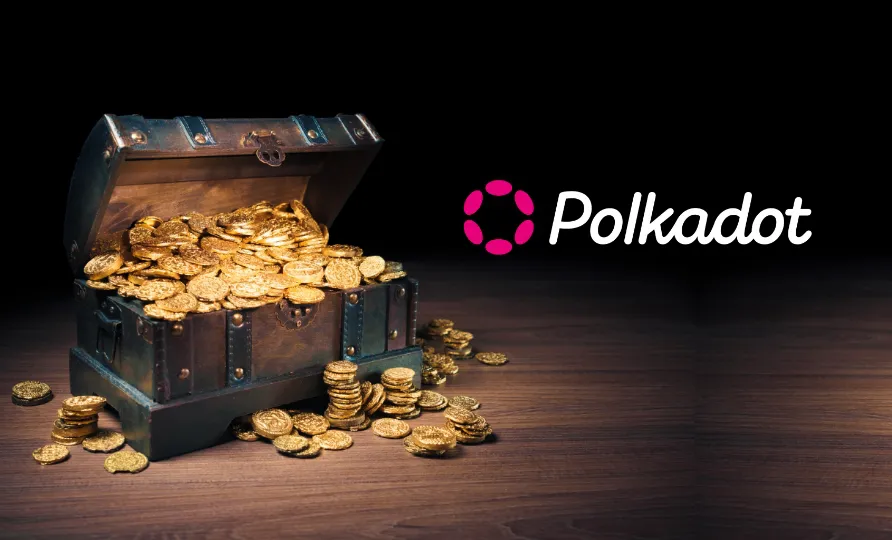Polkadot (DOT) only saw $1M of its treasury spent in July, after backers noticed overspending on marketing. At this rate, Polkadot may run out of treasury reserves in the next two years.
Polkadot (DOT) decreased the outflows of its treasury, after receiving criticism of misspending its marketing budget. The Polkadot treasury has been in the red for the past 12 months, with the most significant outflows in April and May 2024. Some of the outflows are in support of Polkadot’s marketing budget.
The last month saw more than $1M in net outflows, following months with more than $3M in net outflows. The available treasury for promotions and proposals is not the entirety of Polkadot’s reserves, but it has invited scrutiny to marketing spending. The most recent votes went against automated refills for marketing, cutting that expense for Polkadot in an increasingly uncertain market.
Polkadot is a long-running project with a relatively old ICO. Unfortunately, the main Polkadot wallet with the ICO funds was locked after a smart contract accident. Since then, Polkadot managed to recover and build its main products, adding active sidechains. But the project’s presence on social media is still lagging, despite the generous marketing budget.
Polkadot has $25M in 32 currently active bounties as of July 2024. The bounties are available to builders and other ecosystem participants, but the biggest concern are automated grants to content creators. Until recently, the chief focus of Polkadot was on Key Opinion Leader marketing, which ended up spreading the marketing budget to a growing selection of online micro-celebrities and YouTubers with a reach of 400K subscribers.
The hired KOL were a significant drain on Polkadot’s budget, with $390K going to 15 top accounts. However, observers noted that the funds paid for either low-engagement posts, or for low-quality shilling.
You didn't get the memo? Marketing has currently been suspended because the treasury voted against the refill twice in a row
Seems the community forgot to renew the insurance policy
Better to lose $4 billion in market cap than spend $40 million seems
https://t.co/1GtD87q0NI
— Giotto De Filippi (@giottodf) August 5, 2024
Polkadot visibility still low despite big marketing budget
Based on social media metrics, Polkadot has a mid-range X score. The project’s community also claimed Polkadot’s marketing budget is inefficient.
As of July 2024, Polkadot had spent $36.7M on marketing and outreach events, of which more than $4.8M was directly paid to influencers. The treasury payments were the equivalent of 4.9M DOT tokens.
Polkadot has gone above and beyond other crypto projects, which focus on insiders, and has paid for old-school media to grow its outreach, including airport advertising. The bigger problem were the monthly DOT refills to influencers, where the community started noticing that Polkadot was advertised with low-quality content.
In the past few weeks, Polkadot switched to targeting better-known social media accounts, hiring the Pink Brains to keep educating the public. The new contracts will not rely on voluntary creators joining, and will do away with the automated refills. Previously, Polkadot has been criticized for picking perma-bull accounts that shilled DOT with low-quality messages.
DOT price sank despite marketing
Polkadot unleashed up to $87M from its treasury in H1, of which a significant part goes toward direct on-chain expenses and liquidity. Around $24.5M are set aside for bounties and incentives, which includes marketing.
The recent shift in communication suggests the Polkadot community is ready to take up an extremely austere approach to marketing, without KOL and influencer marketing.
The chief reason is Polkadot’s admission that at the current rate of spending, the available treasury will have another two years of runway. The community has therefore spoken against supporting NFT projects in a worsening crypto market, at a time when Polkadot was not selective enough about supporting startups.
Polkadot still has one of the most active building and developer bounty programs, but even those can be abused.
The worst effect of spending was that all KOLs and content producers were paid in DOT, which ended up creating selling pressure. DOT rallied to $10 in 2024, but went on to slide to $4.37. The liberal spending of the treasury ended up hurting DOT, instead of promoting the token.
Polkadot also accelerated its marketing at a time when social media attention was busy with meme tokens, where content was partially organic. At the same time, social media users were skeptical of the KOL’s approach to promoting DOT, even during the active H1 of 2024.
Cryptopolitan reporting by Hristina Vasileva







